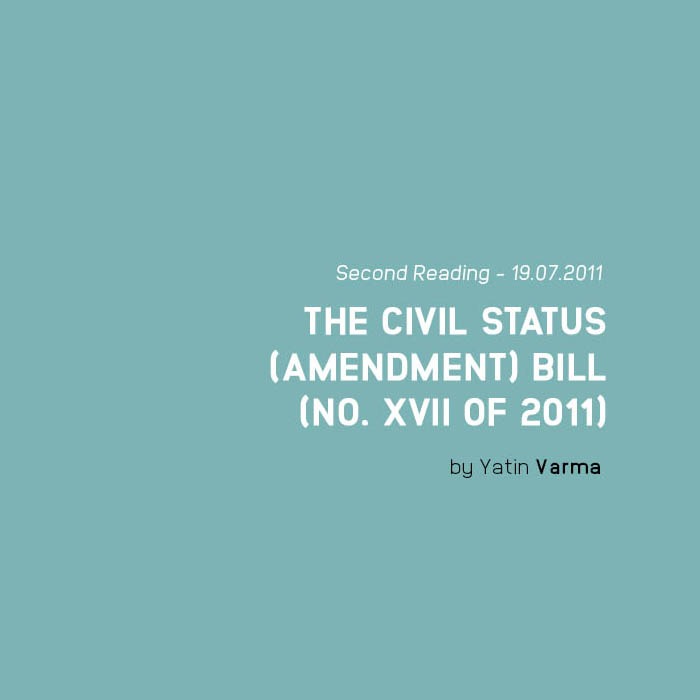Order for Second Reading read.
(5.50 p.m.)
The Attorney General (Mr Y. Varma): Mr Speaker, Sir, I move that the Civil Status (Amendment) Bill (No. XVII of 2011) be read a second time.
Mr Speaker, Sir, this Bill seeks to expedite the processing of applications for change of name by reducing the time period during which an interested party may lodge an objection to an application for change of name from four months to 28 days.
The existing procedure for applications for change of name is set out in Part VII of the Civil Status Act. Under section 55 of the Act, any citizen of the Republic may petition the Attorney General for a change of name. Section 56 sets out the current procedure for notice of the application to be given in the Gazette. Applicants are required to give notice in the Gazette and two daily newspapers. The notice has to be published at least three times in the Gazette and in each of the newspapers. Any interested person may lodge an objection to the application within four months from the last publication.
Mr Speaker, Sir, in terms of statistics, for the past five years, the number of applications which have been received for change of name is as follows –
Year No. of applications received
2007 410
2008 371
2009 427
2010 455
2011 (to date) 228
Mr Speaker, Sir, the number of applications has been on the rise for the past three years. As far as objections are concerned, I am informed that, this year, some ten objections have been received so far.
When an application is received, it is processed on a ‘first come first serve’ basis, unless it is an urgent one. The file is usually referred for Police enquiry, and I have recently given instructions for publications to be done simultaneously.
As I have previously explained, the applicant has to cause notice of the application to be published at least three times in the Gazette and two daily newspapers. The period of four months for any interested party to lodge any objection to the application then runs from the date of last publication. If an objection is raised, grounds of objection have to be filed. Once this procedure has been followed, the application is submitted for the Attorney General’s consideration. All in all, we are currently speaking of a time frame of at least 10 to 12 months before an application can be granted. With this amendment and recent administrative decisions, the aim is to reduce the time frame to around three months.
Mr Speaker, Sir, the problem we have to address is undue delay. The period of four months from the last publication to lodge an objection has existed for some 30 years, ever since the Act was passed in 1981. Over the years, this has contributed to administrative delays before applications for change of name can be considered. The need for change in order to unclog and speed up the system is, therefore, imperative.
There can be no valid reason why any applicant, who has waited for administrative procedures to be followed at the level of my Office and that of the Police and complied with all publication requirements, should have to wait for four additional long months for any interested party to lodge an objection to the application. Instead, the period of “28 days” is considered to be a fair and reasonable time-frame.
Mr Speaker, Sir, I have explained the purport of the amendment. I wish to add that the current period of four months for an objection to be lodged will continue to apply to any application which is pending at the commencement of the Act.
I also wish to inform the House that I intend, by way of notice in the press, to inform the public of the new delay for filing objections before the Act comes into operation on 01 August 2011.
With these words, Mr Speaker, Sir, I commend the Bill to the House.
Mr Von-Mally rose and seconded.
Mr Varma: I would like to thank the Opposition for their support as regards this Bill, and the suggestion of the hon. gentleman is noted.
Mr Speaker, Sir, I commend the Bill again to the House.
Question put and agreed to.
Bill read a second time and committed.


Leave a Reply